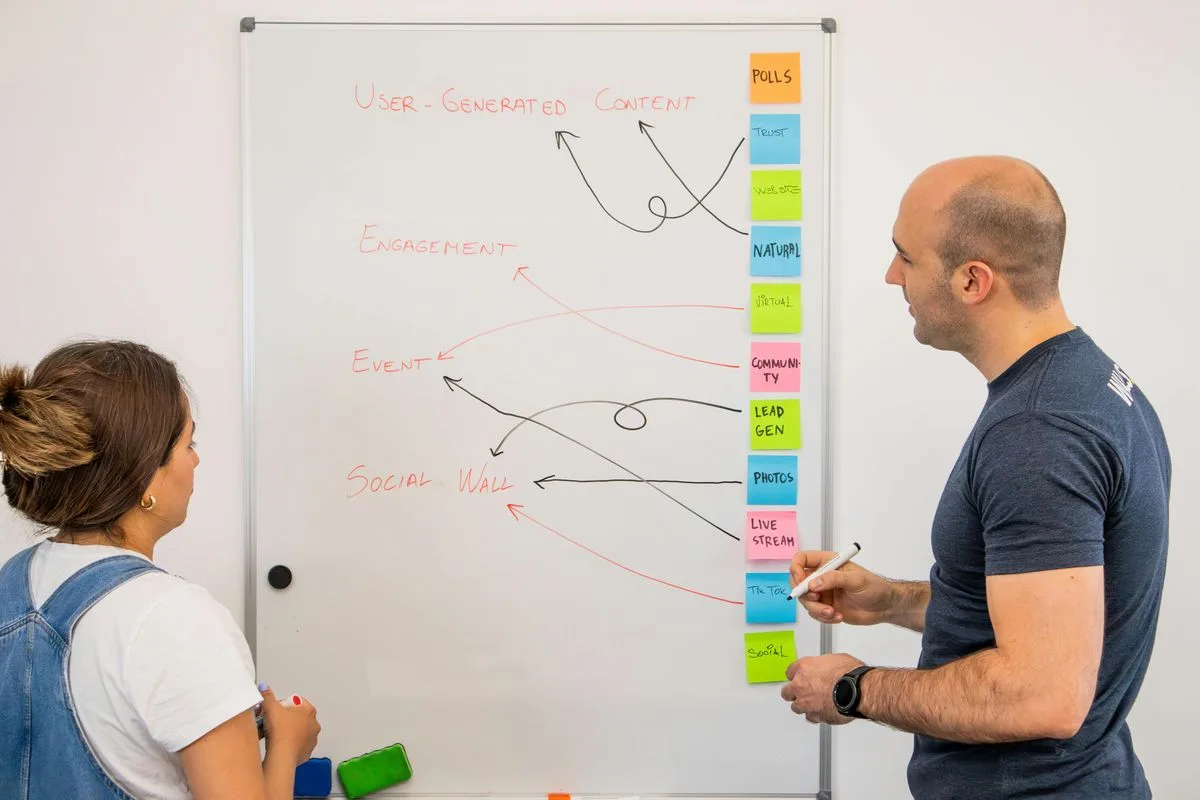Growleady Team
Lead Generation Experts
3 Main Types of B2B Sales: Enterprise, Product, Service
Uncover the three main types of B2B sales: transactional, consultative, and enterprise. Learn how to choose the right approach and maximize success.

The secret to successful B2B sales lies in understanding different sales approaches. In the complex world of business-to-business transactions, understanding the different types of sales approaches can be a game-changer for your company's growth.
Understanding B2B Sales: An Overview
B2B sales, or business-to-business sales, involve transactions between two companies rather than between a company and an individual consumer. It's a complex process that requires a deep understanding of the buyer's needs, industry trends, and the value your product or service brings to the table.
In B2B sales, you're often dealing with multiple decision-makers, longer sales cycles, and higher-value transactions. This makes it crucial to build strong relationships, provide tailored solutions, and demonstrate clear ROI to your potential clients.
Three main types of B2B sales dominate the market:
Supplier Sales
Wholesale/Distribution Sales
Service/Software Sales
Each type has its unique characteristics and challenges, requiring different strategies and approaches.
Supplier Sales focus on providing operational consumables to other businesses. You're selling items like office supplies, equipment, and materials essential for day-to-day operations. These sales typically involve large quantities and complex purchasing processes.
Wholesale/Distribution Sales act as a bridge between manufacturers and retailers. You're selling raw materials or products in bulk at discounted prices. This type of B2B sale requires a deep understanding of supply chain dynamics and market trends.
Service/Software Sales involve selling intangible products or solutions to other businesses. This includes SaaS tools, consulting services, and digital solutions. These sales often come with ongoing subscriptions and support, making relationship-building and customer retention crucial.
Understanding these different types of B2B sales helps you tailor your approach, refine your sales strategies, and eventually close more deals. Whether you're reaching out via cold email or LinkedIn, knowing the nuances of each type allows you to craft more targeted and effective pitches.
Transactional Sales: The First Type of B2B Sales

Transactional sales form the foundation of B2B commerce, focusing on straightforward, product-based exchanges. This approach is ideal for businesses selling standardized products or services with minimal customization.
Key Characteristics of Transactional Sales
Transactional sales are characterized by:
Short sales cycles
Limited customer interaction
Emphasis on price and immediate availability
Standardized products or services
High-volume transactions
In transactional sales, buyers typically know what they want and are primarily concerned with getting the best price. For example, a company purchasing office supplies or raw materials often engages in transactional sales.
When to Use Transactional Sales Strategies
Transactional sales strategies are most effective when:
Selling commodities or widely available products
Dealing with repeat customers who know their needs
Operating in price-sensitive markets
Offering products that require minimal explanation or customization
For B2B sales professionals using cold email or LinkedIn outreach, transactional sales strategies can be particularly useful when:
Targeting businesses with known, recurring needs
Promoting special offers or discounts on standard products
Reaching out to existing customers for reorders
Introducing new, easy-to-understand products to your catalog
To maximize the effectiveness of transactional sales in B2B contexts:
Streamline your ordering process
Provide clear, concise product information
Offer competitive pricing and volume discounts
Carry out efficient customer service for quick issue resolution
By understanding and leveraging transactional sales strategies, you'll be better equipped to handle straightforward B2B sales scenarios and build a foundation for more complex sales relationships.
Consultative Sales: The Second Type of B2B Sales
Consultative sales focus on building long-term relationships and providing tailored solutions to meet specific client needs. This approach involves in-depth discussions and analysis to understand the client's business challenges and goals.
The Consultative Sales Process
The consultative sales process involves several key steps:
Research: Gather information about the client's industry, company, and potential pain points.
Discovery: Conduct in-depth conversations to uncover the client's specific needs and challenges.
Analysis: Evaluate the gathered information to identify potential solutions.
Presentation: Propose a customized solution that addresses the client's unique requirements.
Collaboration: Work closely with the client to refine and carry out the solution.
Follow-up: Maintain ongoing communication to ensure satisfaction and identify new opportunities.
This approach requires strong listening skills, industry knowledge, and the ability to ask insightful questions. You'll need to position yourself as a trusted advisor rather than just a vendor.
Benefits of Consultative Selling in B2B
Consultative selling offers numerous advantages in B2B contexts:
Stronger relationships: By focusing on the client's needs, you build trust and foster long-term partnerships.
Higher deal values: Customized solutions often command premium prices, increasing your average deal size.
Increased customer loyalty: Clients are more likely to stick with a provider who understands their business and offers tailored solutions.
Competitive differentiation: Your expertise and personalized approach set you apart from competitors who focus solely on product features or price.
Cross-selling opportunities: Deep understanding of client needs allows you to identify additional products or services that may benefit them.
To excel in consultative selling, develop your active listening skills, stay updated on industry trends, and cultivate a problem-solving mindset. Remember, your goal is to become a valuable partner in your client's success, not just a supplier of goods or services.
Enterprise Sales: The Third Type of B2B Sales
Enterprise sales, the third main type of B2B sales, focus on high-value, complex deals with large organizations. This approach requires a strategic mindset and a deep understanding of the client's business needs.
Exploring Complex Enterprise Sales
Enterprise sales involve multiple decision-makers and longer sales cycles. You'll need to:
Identify key stakeholders in the organization
Understand the company's decision-making process
Present tailored solutions that address specific pain points
Navigate bureaucratic hurdles and internal politics
To succeed, create a detailed account map outlining the roles and influence of each stakeholder. Use this information to craft personalized pitches that resonate with different decision-makers. Remember, in enterprise sales, you're not just selling a product; you're selling a vision of how your solution will transform the client's business.
Long-Term Relationship Building in Enterprise Sales

Enterprise sales thrive on strong, lasting relationships. Here's how to build them:
Invest time in understanding the client's industry and challenges
Provide ongoing support and value beyond the initial sale
Establish yourself as a trusted advisor, not just a vendor
Anticipate future needs and proactively offer solutions
Don't rush the process. Enterprise sales often take 6-18 months to close. Use this time to demonstrate your commitment to the client's success. Share relevant industry insights, introduce them to valuable connections, and offer strategic advice. These actions position you as a valuable partner, increasing the likelihood of closing the deal and securing future business.
By mastering enterprise sales, you'll unlock opportunities for high-value contracts and long-term partnerships with major organizations. Remember, patience and persistence are key in this complex but rewarding form of B2B sales.
Choosing the Right B2B Sales Approach for Your Business
Selecting the optimal B2B sales approach is crucial for your business's success. It's like choosing the right tool for a specific job – you need to match your sales strategy to your product or service, target market, and business goals.
Product-Based Sales: Tangible Solutions
If you're selling physical goods, product-based sales is your go-to approach. This method works best when:
Your offerings are tangible and easily demonstrable
Customers need to see, touch, or test the product before buying
You're selling to industries like manufacturing, construction, or retail
For example, if you're selling industrial machinery, arranging product demonstrations or offering trial periods can be highly effective. Remember, in product-based sales, highlighting unique features and benefits is key to standing out from competitors.
Service-Based Sales: Expertise on Demand
Service-based sales shine when you're offering professional expertise or specialized skills. This approach is ideal when:
Your offerings are intangible and knowledge-based
Customers need personalized solutions to complex problems
You're targeting industries like consulting, finance, or IT
When selling services, focus on showcasing your team's expertise and past successes. Case studies and testimonials are powerful tools in service-based sales, as they provide concrete evidence of your ability to deliver results.
Partnering with Growleady can further enhance your outreach, helping you connect with the right prospects and demonstrate your expertise effectively.
SaaS Sales: Streamlined Solutions
Software as a Service (SaaS) sales is the perfect fit for cloud-based software solutions. This approach works best when:
Your product is accessed via the internet and regularly updated
Customers benefit from scalability and flexible pricing models
You're targeting businesses looking to improve efficiency and reduce IT costs
In SaaS sales, offering free trials or freemium models can be highly effective. These allow potential customers to experience the value of your software firsthand, increasing the likelihood of conversion.
Tailoring Your Approach
To choose the right B2B sales approach:
Analyze your product or service: Determine which category it falls into – product, service, or SaaS.
Understand your target market: Research your potential customers' needs, pain points, and buying behaviors.
Assess your resources: Consider your team's skills, available technology, and budget.
Test and refine: Start with the most appropriate approach, but be ready to adjust based on results and feedback.
Remember, the best B2B sales approach isn't always a one-size-fits-all solution. You might need to combine elements from different approaches or adapt your strategy as your business evolves. The key is to remain flexible and customer-focused, always striving to provide the best possible solution to your clients' needs.
Conclusion
Understanding the three main types of B2B sales is crucial for your business success. Whether you're engaged in supplier sales, transactional sales, or enterprise sales, each approach offers unique advantages.
By choosing the right strategy, you'll be better equipped to meet your clients' needs and drive growth. Remember flexibility and adaptability are key in the ever-changing B2B world.
As you refine your approach, you'll build stronger relationships, foster trust, and eventually achieve long-term success in the competitive world of B2B sales.
Frequently Asked Questions
What are the main types of B2B sales approaches discussed in the article?
The article discusses several B2B sales approaches, including Supplier Sales, Wholesale/Distribution Sales, Service/Software Sales, Transactional Sales, Consultative Sales, and Enterprise Sales. Each approach has its unique characteristics and is suited for different business scenarios and client needs.
What is Enterprise Sales and how does it differ from other B2B sales approaches?
Enterprise Sales focuses on high-value deals with large organizations. It involves understanding complex client needs, navigating decision-making processes, and building long-term relationships. Unlike other approaches, Enterprise Sales typically has longer sales cycles (6-18 months) and requires a more personalized, consultative approach to close valuable partnerships with major organizations.
How long does an Enterprise Sales cycle typically last?
An Enterprise Sales cycle typically lasts between 6 to 18 months. This extended timeframe is due to the complexity of the deals, the need to navigate multiple decision-makers within large organizations, and the importance of building trust and long-term relationships with clients.
What are the key factors for success in Enterprise Sales?
Success in Enterprise Sales requires creating personalized pitches, establishing trust as a trusted advisor, and offering ongoing support. Patience and persistence are crucial, as is the ability to understand and address complex client needs. Building long-term relationships and navigating complex decision-making processes are also essential for closing high-value deals.
What are the three main B2B sales approaches for different business types?
The article highlights three main B2B sales approaches: product-based sales for tangible solutions, service-based sales for expertise on demand, and SaaS sales for streamlined software solutions. Each approach is tailored to specific industries and customer needs, emphasizing unique features, expertise, and customer experience.
How can businesses choose the right B2B sales approach?
To choose the right B2B sales approach, businesses should analyze their product or service category, understand their target market, assess available resources, and continuously test and refine strategies. Flexibility and customer-centricity are key in providing tailored solutions to meet clients' requirements effectively.
What is the importance of offering trial periods or free trials in B2B sales?
Offering trial periods or free trials is crucial in B2B sales, especially for service-based and SaaS sales. It allows potential clients to experience the product or service firsthand, reducing perceived risk and enhancing customer experience. This approach can significantly improve conversion rates and build trust with potential clients.


